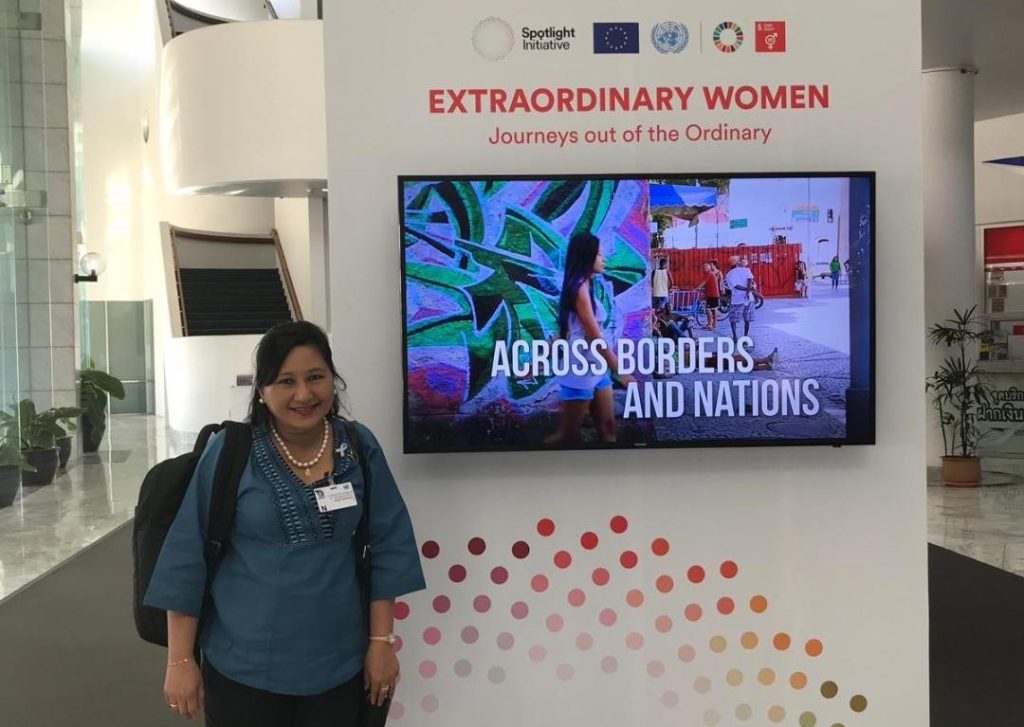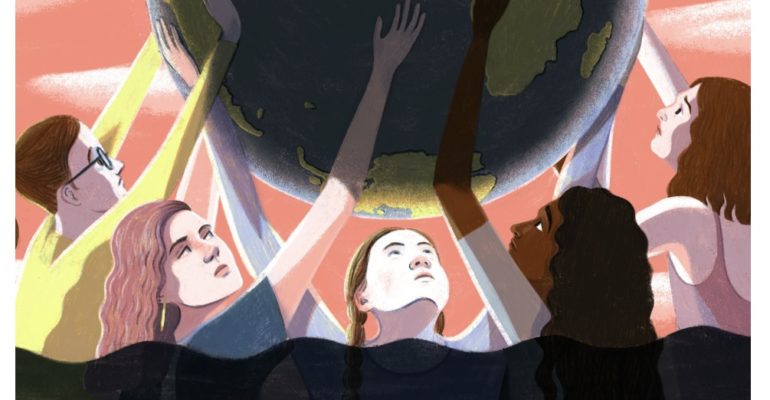2020: A New Decade Opens Before Us
Blog of Evelyne Para, UN Representative of SI at UNESCO.
“A hundred years after the “roaring twenties” that carried a creative euphoria and an almost fanatic belief in the industrial revolution, we are entering the “worrying twenties”. On the menu for this new decade: disenchantment, existential distress and fantasy of the apocalypse!
Our society is more and more concerned by the climate emergency and the erosion of biodiversity, it’s blinded by the digital revolution, it has to endure the pressure of social networks (“fear of missing out”), the pressure of social and economic crises, world-wide migratory pressure, and our communities are also gangrened by disorders of all kinds (increase in intolerance, violent extremism, poverty and health issues …).
The younger generations know that they will not remake the world. But perhaps their task is greater, it’s to prevent the world from falling apart, by attaching more importance to issues of social justice, ecology, civic engagement and education.
After decades of growth, humanity has come to the limit of the planet, whether it be water, fossil fuels, arable lands, waste absorption or ecosystem recovery. And, whether we like it or not, the only realistic way that will preserve the survival of humanity will be to transform our economic model and our lifestyles; to adjust them to the available and renewable resources.
 Our survival will also depend on our ability to learn to “live better together” while respecting our cultural diversity and favouring a culture of peace. And perhaps it will also depend on new art forms, we think for example of immersive devices, 3D or virtual reality, to push further the desire of life, the emotion born of creation and creativity, by introducing gender issues and a touch of wonder for greater freedom. Don’t we say that “to create is to live twice, it is also to shape one’s destiny”.
Our survival will also depend on our ability to learn to “live better together” while respecting our cultural diversity and favouring a culture of peace. And perhaps it will also depend on new art forms, we think for example of immersive devices, 3D or virtual reality, to push further the desire of life, the emotion born of creation and creativity, by introducing gender issues and a touch of wonder for greater freedom. Don’t we say that “to create is to live twice, it is also to shape one’s destiny”.
So what can we hope for the next decade? How to respond to this frightening reality? What will be our new life prospects? This is one of the responses that UNESCO has chosen to develop: ‘Rethinking Education, towards a global common good?‘, a call for dialogue inspired by a humanistic vision of our changing world’s development.
By making it open to all, inclusive and of good quality, education will transform our lives.”
What Does the Future Hold for Education?
Blog by Marie-Christine, SI UN Representative at UNESCO.
“On 24 January 2020, UNESCO celebrated the International Day of Education. The celebration was attended by several panels of experts and witnesses around the theme ‘learning for people, planet, prosperity and peace’.
The programming responded to UNESCO’s concern about the imperative need to rethink education so that the citizens of tomorrow can respond to the challenges of the future. Education must be reviewed both in curriculum content and in teaching methods to take account of the problems posed by world transformations, from climate change to social and political transformations, and to integrate the contributions of technologies and sciences without ignoring the impact of their use on social relations and individual behaviors, and the perception that the young gain about the environment through information technologies.
This review of education must take place in a context of the target of Sustainable Development Goal 4 (SDG 4) being far from achieved by 2030, and consider many critical points: financial investments for school networking in poor countries with high population density, quality of education, gender disparity, people with disabilities, inter alia.

Sustainable Development Goal 4: Ensure inclusive and equitable quality education and promote lifelong learning opportunities for all.
On 28 and 29 January, the first meeting of the Commission on the Future of Education will be held.
“The mandate of the International Commission on the Futures of Education is to collectively reflect on how education might need to be re-thought in a world of increasing complexity, uncertainty, and precarity.
The commission will present analysis and recommendations in the form of a report which will serve as an agenda for policy dialogue and action at multiple levels. Looking at the year 2050 and beyond, the report will suggest visions and strategies for both education policy and education practice to adopt.
The Commission is to take into consideration recent geopolitical shifts, accelerated environmental degradation and climate change, changing patterns of human mobility, and the exponential pace of scientific and technological innovation. At the same time, the report should envisage and analyse the multiple possible futures of technological, social, economic, and environmental disruption and how education might both affect and be affected by these futures”. – Read more here.
UNESCO are offering the opportunity to input your thoughts on what you envision will be the key issue affecting the future of education. Click here to add your voice to the discussion”.
Reviewing Our Past to Strengthen Our Future
2020 is a momentous year. It marks the 75 Anniversary of the United Nations, and of the Economic and Social Council, 25 years since the Beijing Declaration and Platform for Action was agreed, and 20 years since the Women, Peace and Security Agenda was launched. Now is the time for reviewing progress made towards gender equality and for committing to improving the implementation of women’s rights.
Reporting from the Asia Pacific Beijing +25 Regional Review Forum held in Bangkok, SI UN Representative, Theresa Devasahaym explains some of the key issues affecting young women in the region:

SI UN Representative, Theresa Devasahayam, at the Asia Pacific Beijing +25 Regional Review Forum held in Bangkok.
“The forum saw a gathering of Ministers and senior officials, Civil Society Organisations (CSOs) and other key stakeholders from across the Asia-Pacific region to:
a) identify key strategic areas and actions required to overcome barriers to gender equality and the empowerment of women;
b) provide a platform to highlight innovative solutions and exchange good practices and lessons learned on strategies for change;
c) invigorate the momentum to achieve gender equality and the empowerment of women through increased engagement with stakeholders of different ages.
Some striking issues which were discussed at this forum were the anxiety millennials living in this region felt in the job market and increasing precarity, especially with rising inflation and the emergence of the gig economy; the persistence of degrading depictions of women in the media; rape and sexual harassment in public spaces and the lack of legislation protecting women; lack of access to reproductive health services because of religious injunctions on sexuality and reproduction; and the sense that men and boys are not sufficiently engaged in advocacy for women’s rights.”
Click to here read more from Theresa’s comprehensive summary of the findings and outcomes of this tremendous forum.

Gaining Momentum
In the months ahead, the SI UN Representatives, together with the wider SI Advocacy team, will be preparing for the upcoming 58th Session of the Commission for Social Development (CSocD58), and the 64th Session of the Commission on the Status of Women (CSW64).
CSoCD58 will take place from 10 to 19 February at the United Nations Headquarters in New York. This Session’s priority theme is ‘Affordable Housing and Social Protection Systems For All to Address Homelessness’. SI have been granted permission to host a side event on 12 February, where SI President Sharon and SI UN Representatives will discuss the intersection between homelessness and ageing, taking into consideration both individual and structural drivers of homelessness. SI’s written statement to CSocD58 (which is available here on the CSocD website) calls for States to ensure that homeless women and girls have access to essential services, including education at all stages of life, healthcare, legal and banking services, and have the ability to vote.
CSW64 will be held at the United Nations Headquarters in New York from 9 to 20 March 2020. Representatives of Member States, UN entities, and ECOSOC-accredited non-governmental organisations (NGOs) will be in attendance. The priority theme will be to review and appraise the implementation of the Beijing Declaration and Platform for Action and the outcomes of the 23rd Special Session of the General Assembly.
Soroptimist International plans to host several parallel events and will submit an oral statement to the Commission. Further to this, we are pleased to share with you our joint written statement with Zonta International. Our statement calls for better, more accessible education for all women and girls, at all stages of life. The statement addresses the need to eliminate all forms of violence against women and girls and offers recommendations for policy administration in gender mainstreaming.
Feature image courtesy of UNESCO.

